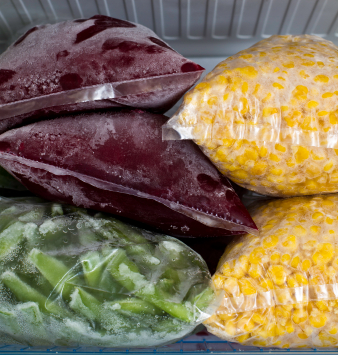Most meals will freeze very well. Individual ingredients, on the other hand, are a different story.
Freezing foods can change texture, physical structure and flavour of some foods. Some are not freezer friendly at all and deteriorate almost to the point of being unusable after being frozen, thawed and heated.
Foods that DO Freeze Well
Meat, poultry and fish all can be frozen Raw meat is better for long storage because it doesn’t dry out or get freezer burn as fast as cooked meat.
Breads and baked goods are freezable. This includes cakes, pies, muffins, bagels, quick and yeast breads both as dough/batter or baked, cookies raw or baked and pizza crusts raw or baked.
Butter and margarine freeze very well.
Beans freeze well and can save you quite a bit of money if you buy dry beans then soak and cook them yourself instead of buying them canned.
Raw vegetables with low water content such as carrots, broccoli and beans, etc… These vegetables should be blanched first before freezing. On serving day, be sure to cook from frozen and do not defrost first, as they would get soggy and lose flavour.
An exception to this list is potatoes. Do not freeze raw potatoes, as they will turn black and lose texture. However, mashed potatoes do freeze okay
Pastas will become much soften after they are frozen and should only be cooked about three quarters of the recommended time. Also pastas frozen in liquid or sauce will absorb much of the sauce.
Rice can also freeze and cooking it ahead can save a ton of time.
Citrus zest but not citrus whole. Unless you are planning to eat the citrus frozen, such as combined in a dessert
Cooked eggs that are scrambled or used in a recipe freeze well. Boiled eggs don’t do as well because the whites get rubbery.
Foods that DON’T Freeze Well
Raw vegetables with high water content such as cucumbers, celery, lettuce, onions, peppers (especially green), tomatoes, radishes, sprouts and salad greens. These foods become very soggy, once defrost. It’s not recommended especially if you are thinking that you want to defrost and eat them raw again. Sometimes, they work okay if you want to use the item to cook in something, such as tomatoes for tomato sauce
Fruit such as apples, grapefruit, grapes (unless you’re planning on eating them frozen), lemons, limes, oranges, watermelon
Herbs (if frozen alone in sprigs): Basil, chives, parsley, other soft herbs
Spices may become bitter when frozen including pepper, cloves, garlic, green pepper, imitation vanilla, and onions. Paprika and celery also taste different after being frozen.
Milk can be frozen but tends to separate and become watery after being frozen.
Cheese blocks and slices of cheese, along with soft cheese like cottage cheese, cream cheese and brie do not freeze well. Shredded hard cheese, such as mozzarella and cheddar freeze well
Mayonnaise recipes that include mayo such as dips, egg salads, casseroles with mayo. The mayo separates and the texture is compromised.
Raw eggs in shells are not recommended, as eggshells can crack easily, and even if the shells remain intact, the consistency of egg yolks makes them difficult to use for anything other than hard-boiling.
What food items do you freeze successfully and how do you do it?

